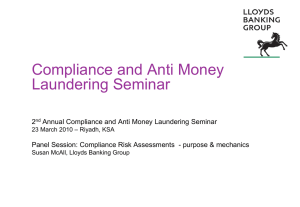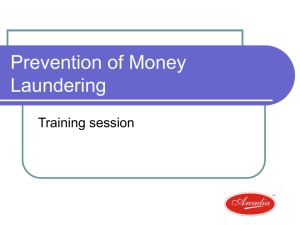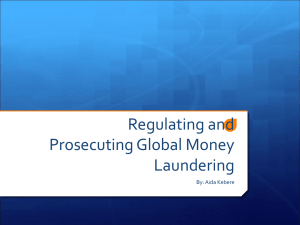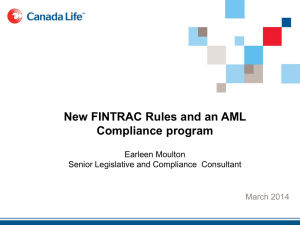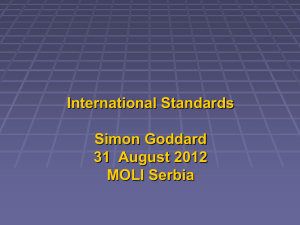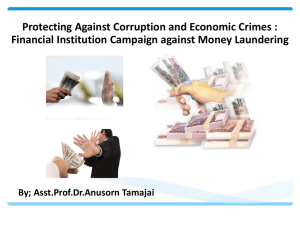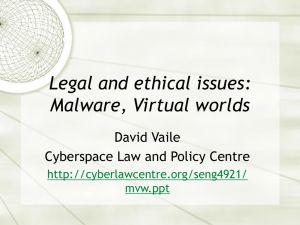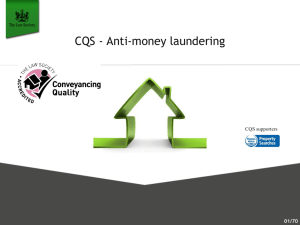regulatory framework for curbing internet crimes
advertisement
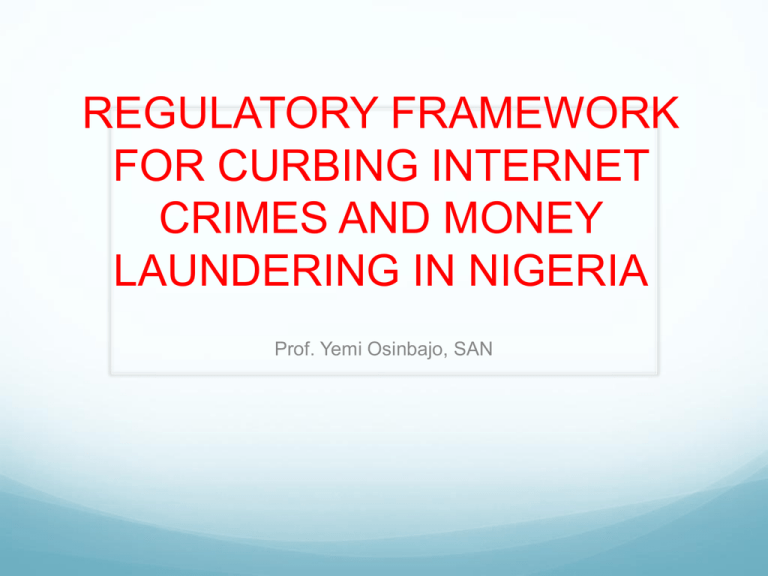
REGULATORY FRAMEWORK FOR CURBING INTERNET CRIMES AND MONEY LAUNDERING IN NIGERIA Prof. Yemi Osinbajo, SAN INTRODUCTION The global nature of the internet has created an environment which allows criminals to perpetrate almost any illegal activity anywhere in the world even without being physically present at the locus of the crime. The most common form of internet crime is its use in the commission of economic and financial illegalities. The Internet has been deployed by terrorists, particularly for recruitment and the incitement of radical and dissident groups against institutions and governments. This has posed a serious threat to national and international security. NIGERIA: REPUTATION NIGERIA IS WIDELY REGARDED AS THE SCAM CAPITAL OF THE WORLD. ESPECIALLY BECAUSE OF THE HIGH INCIDENCE OF ADVANCE FEE FRAUD LETTERS ORIGINATING FROM NIGERIA. REPUTATION V REALITY FACTS TELL A DIFFERENT STORY INTERNET SCAMS TRACEABLE TO; US………61% UK………16% NIGERIA…6% THE ORIGINATORS: The Crime Trail (FBI) UNDERSTANDING INTERNET FRAUD UNDERSTANDING INTERNET FRAUDS 1. Organize – Fraudsters work together, sharing skills, successes, and information, allowing them to innovate faster and pool their resources for larger, more successful attacks. Creation of Malware and apps happen here. 2. Advance –They reinvest their "earnings" to continually improve their techniques and technologies. And they're very quick to adjust as soon as the banking community demonstrates an ability to defeat one of their schemes. 3. Expand – Criminals are targeting more account holder touch points, including online banking, mobile devices, and clients' ACH batch files. 4. Scale – They are moving away from single bank attacks and scaling their efforts to reach thousands of banks, including community banks, by targeting banking platforms. 5. Evolve – Fraudsters are further adapting their approaches to compromise bank employees to gain direct access to accounts and systems such as the FI's wire system. NETWORK FEATURES Nigerian fraud operates at a retail level and has gained notoriety because of the sheer numbers of scam emails sent around the world. The reputational impact for Nigeria is far worse than the actual contribution of these acts to global internet criminality. Whereas Easter Europe is entirely responsible for malware innovation and organised crime that attacks the international financial system. Scale is monumental running into hundreds of millions of Dollars annually WHAT CONSTITUTES INTERNET CRIMES Internet crime, computer crime, or cyber-crime is one of the fastest growing types of illegal/criminal activities in Nigeria and internationally. There are several types of internet crimes, many of which overlap. The most common of the lot are: Phishing: This is where a potential internet criminal sends fraudulent e-mails to a recipient or several recipients in an attempt to trick them usually for the purpose of obtaining money from them. These mails usually contain a ‘business proposal’ introducing one form of business venture or another to the recipient. Elderly people have been said to be the most susceptible to this type of internet crime. 419 Section 419 of the Criminal Code Act criminalises obtaining money by false pretenses. Section 311 of the Criminal Law of Lagos State, 2011 defines ‘false pretense’ as a representation, whether deliberately, or recklessly, in writing or by conduct, which representation is false in fact or law and which the person making the representation knows to be false or does not believe to be true. ADVANCED FEE FRAUD AND OTHER RELATED OFFENCES ACT 2006 HACKING Hacking: This is similar to digital trespassing. A type of malware criminality. It involves the infiltration of online networks to illegally download confidential information, manipulate functions, and in some cases, steal identities that can be fraudulently used to purchase goods online or to obtain money through other means. Section 385 of the Criminal Law of Lagos State criminalises this conduct. Any act aimed at securing unauthorised access to any program or data attracts a 2-year imprisonment term. HARASSMENT Harassment: threats, sexual, bullying Section 262 of the Criminal Law of Lagos State, 2011 makes it an offense to sexually harass another person. A 3-year imprisonment term is imposed on any individual in breach of this provision. ` SEXUAL HARASSMENT The Section defines sexual harassment as an unwelcome sexual advance, request for sexual favour, and other visual, verbal or physical conduct of a sexual nature. Internet stalking and harassment can be said to fall within this definition of sexual harassment. TERRORISM: ON-LINE RECRITMENT The internet has been used by various terrorist organisations and networks to indoctrinate individuals, particularly youths, and recruit them into their rank and file. Section 1 (2) (a) of the Nigeria Terrorism (Prevention) Act, 2011 defines terrorism as an act which is deliberately done with malice aforethought and which may seriously harm or damage a country or an international organisation. Section 3 of the Act criminalises any act that seeks to procure any support to a terrorist organisation in its bid to recruit new members. TERRORISM Section 2 (3) and 4 (1) provide that a person who belongs to a proscribed organisation or renders support for an act of terrorism is liable on conviction to imprisonment for a maximum term of 20 years. Section 13 obligates financial institutions to notify the Financial Intelligence Unit within 72 hours of any suspicious transactions relating to terrorism with the confidentiality of such report strictly maintained at the pain of a minimum fine of N5m or imprisonment for 5 years. Internet recruitment of new members of terrorist organisations is covered under the above sections. PREDATORS Sexual Offences Relating to Children: Pedophiles use the internet to procure children to engage in immoral sexual activity with them. Section 135 of the Criminal Law of Lagos State, 2011 criminalises unlawfully and indecently dealing with a child. This conduct attracts a 7-year imprisonment term. Section 222 of the Criminal Code Act contains a similar provision. MALWARE CRIMES Malware, short for malicious software, is software used to disrupt computer operation, gather sensitive information, or gain access to private computer systems. It can appear in the form of code, scripts, active content, and other software. 'Malware' is a general term used to refer to a variety of forms of hostile or intrusive software. Malware (contd.) Malware include computer viruses, ransomware, worms, trojan horses, rootkits, keyloggers, dialers, spyware, adware, malicious BHOs,rogue security software and other malicious programs; the majority of active malware threats are usually worms or trojans rather than viruses. In law, malware is sometimes known as a computer contaminant, as in the legal codes of several U.S. states. Malware is different from defective software, which is a legitimate software but contains harmful bugs that were not corrected before release. Eastern Europe features heavily as source of most malware creation activities. MALAWARE ATTACKS Distribution of malwares and viruses into computer softwares Section 388 of the Criminal Law of Lagos State prohibits the unauthorised modification of computer data with intent to impair the operation of the computer or hinder access to any program on it. The Section prescribes a 5-year imprisonment term for a person who defaults under the Section. MONEY LAUNDERING What Is Money Laundering? Money laundering is or servicesthe process of concealing money, either intentionally or by merely using financial systems that do not identify or track its sources and destination. The Anti-Money Laundering/Combating Financing of Terrorism Regulations, 2009, defines Money Laundering as the process whereby criminals attempt to conceal the origin and or ownership of money, property and other assets that are or were derived from a criminal activity or activities. THE LEGISLATION The Money Laundering Prohibition Act (MLPA), 2011 is the directive as imposed by the Anti-Money Laundering (AML) framework that prohibits the laundering of the proceeds of crime or illegality anywhere in the world. By virtue of Section 1 of the Act, for financial institutions, any transaction in excess of N5 million in the case of an individual (previously N1million) and N10 million in the case of a body corporate (previously N5million) shall be disclosed to the Nigerian financial Intelligence Unit for onward transmission to the appropriate government office. TYPES OF MONEY LAUNDERING Types of Money Laundering; Limitation on amount of cash payment: Section 1 of the Money Laundering Act, 2011. Concealing money, either intentionally or by merely using financial systems or services that do not identify or track its sources and destination. METHODS OF MONEY LAUNDERING Methods of Money Laundering Trade-based laundering: This is the process of under or overvaluing invoices to disguise the movement of money. Cash Intensive Businesses: By using this method, a business typically involved in receiving cash uses its accounts to deposit both legitimate and criminally derived cash, claiming that all of it is legitimate earnings. Service businesses usually adopt this method as they have no variable costs and it is hard to decipher discrepancies between revenues and costs. METHODS Structuring: This is also known as smurfing. With this method, cash is broken down into smaller deposits to evade suspicion of money laundering. A sub-component of this is to use smaller amounts of cash to purchase bearer instruments, such as money orders, and then ultimately deposit those again in smaller amounts. Round-tripping: Using this method, money is deposited in a controlled foreign corporation offshore, usually in a tax haven where minimal or no financial records are kept, and then shipped back as a foreign direct investment which is exempt from taxation. Bank capture: Here, money launderers buy controlling interests in a bank in a jurisdiction with weak money laundering controls and then move the money through the bank without any scrutiny or detection. METHODS Bulk cash smuggling: This is a very common method of money laundering. The money launderer physically smuggles money to another jurisdiction and deposits it in a financial institution, such as an offshore bank where there are weak or minimal money laundering controls. Casinos: In this method, an individual walks into a casino and pays for chips, plays for a while, and then cashes in the chips, taking payment in a cheque, or just getting a receipt, claiming it as gambling winnings. Legislative framework MONEY LAUNDERING PROHIBITION ACT 2011 TERRORISM (PREVENTION) (PROHIBITION) ACT 2011 CBN KNOW YOUR CUSTOMER CIRCULARS ESPECIALLY THE LATEST AUGUST 2012 WHICH ALIGNS ALL EXISTING LEGISLATION AND THE REVISED FINANCIAL ACTION TASK FORCE(FATF) 40 RECOMMENDATIONS. ADVANCED FEE FRAUD AND OTHER FRAUD RELATED OFFENCES ACT 2006 (SEC 7) EFCC,(17&18) ICPC AND NDLEA ACTS PROVING INTERNET CRIMES COMPUTER-GENERATED EVIDENCE COULD INCLUDE…… EMAILS INSTANT MESSAGING AND HISTORIES PHONE RECORDS AND LOGS ATM TRANSACTION LOGS PRINT- OUTS SPREADSHEETS INFORMATION ON SOCIAL MEDIA; FACEBOOK , TWITTER VIDEOS – YOU TUBE DIGITAL PHOTOGRAPHS DVDS CDS FILES SAVED FROM ACCOUNTING PROGRAMS CHECK-LIST FOR GATHERING,ADMISSIBILITY AND WEIGHT RELEVANCE +( LARGELY DETERMINED BY THE EVIDENCE ACT 2011)- SECTION 1 EA 2011 IS IT A DOCUMENT? WAS IT PROPERLY OBTAINED? HEARSAY OR DIRECT EVIDENCE ORIGINAL OR COPY CONDITIONS PRECEDENT: RELIABILITY CERTIFICATE WEIGHT – SECTION 34 EA IS IT A DOCUMENT? FOR COUNSEL THE CRUCIAL QUESTION IN KNOWING WHAT RULES TO APPLY IS WHAT TYPE OF EVIDENCE IS THE PARTICULAR E-EVIDENCE? E.G IS AN EMAIL BEFORE BEING PRINTED OUT A DOCUMENT? IS A DVD OR CD A DOCUMENT? IS A POSTING ON FACEBOOK DOCUMENTARY? WHAT IS A DOCUMENT SECTION 258 EA: “includes: ….any disc, tape, sound track,or other device in which sounds and other data( not visual images) are embodied so as to be capable of being reproduced. Any film, negative, tape or other device in which one or more visual images are embodied ANY DEVICE BY WHICH INFORMATION IS RECORDED, STORED OR RETRIEVABLE INCLUDING COMPUTER OUTPUT.- PHONES, IPADS WHAT IS A COMPUTER S. 258 of the Evidence Act 2011 : “Any device for storing and processing information, and any reference to information being derived from other information is a reference to its being derived from it by calculation comparison or any other process.” *** PHONES, IPADS, ANDROIDS, MANY ELECTRONIC HAND HELD DEVICES QUALIFY Computer - Generated Documents RELEVANT STATEMENTS IN DOCUMENTS PRODUCED BY COMPUTERS ARE ADMISSIBLE SUBJECT TO CONDITIONS PRECEDENT BEING MET, ( S. 84 of the Evidence Act of 2011). THIS PROVISION APPLIES TO EMAILS, TEXT MESSAGES, POSTINGS ON FACEBOOK, TWITTER ETC WAY FORWARD Developing an institutional structure to fight internet fraud. A Cyber Security Secretariat which advises the government on issues regarding internet policies and development. Enforcement of relevant internet banking regulations which can operate to clamp down on internet related fraud and money laundering activities. Collaborating with international institutions and bodies on cyber crime and internet terrorism. CYBERCRIME WORKING GROUP- GET TO WORK! In 2003, the Nigerian Cybercrime Working Group (NCWG) was inaugurated under the Chairmanship of the Attorney-General of the Federation and Minister of Justice. The NCGW, which is still awaiting legal recognition, has as its members all key law enforcement, security, intelligence, ICT agencies of the government including the Economic and Financial Crimes Commission (EFCC), the Nigerian Police Force (NPF), National Security Adviser (NSA), Nigerian Communications Commission (NCC), Department of State Services (DSS), National Intelligence Agency (NIA), Nigerian Computer Society (NCS), Nigerian Internet Group (NIG), Internet Services Providers’ Association of Nigeria (ISPAN), National Information Technology Development Agency (NITDA), and individual citizens representing public interests. The Group is expected to handle cybercrime and cyber security matters, and coordinates enforcement, investigation as well as prosecution, with other law enforcement agencies in the country.
